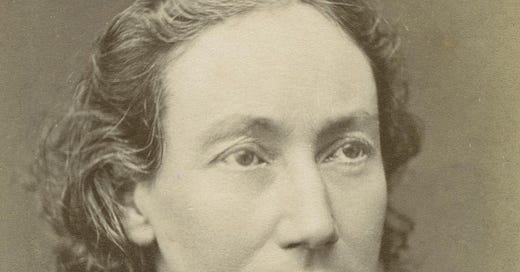You know that saying, well behaved women rarely make history? It could have been coined for Louise Michel. Because, she was unequivocally, and unashamedly a rampant trouble maker…
(Wikipedia)
Born into humble circumstances in the north of France in 1830, she became a teacher, and by 1865 had opened a school in Paris. She knew Victor Hugo, and published poetry of her own, but it was as a political activist that she would gain notoriety. She was a radical, and by 1869 was a member of the Société pour la Revendication des Droits Civils de la Femme (Society for the Demand of Civil Rights for Women), which was focused in particular on improving girls’ education.
Then came war with Germany in 1870, and complete humiliation for France. By the beginning of September the army had been routed and the Second Empire was in tatters:
Paris did not waste time worrying about Napoleon III; the Republic existed before it was proclaimed... A sea of humanity filled the Place de la Concorde. In the background, the last defenders of the Empire were lined up in battle order: municipal guards and sergeants de ville, believing themselves obliged to obey the discipline of the coup d'état, but it was well known that they could not awaken it from the dead. Around noon, armed National Guardsmen arrived along Rue Royale. Before them, the municipal guards, sabres drawn, formed into a close battalion. They fell back with the sergeants when the National Guards advanced with fixed bayonets. Then there was a great shout from the crowd, a clamour rising to the sky as if sown in the wind: Long live the Republic! The sergeants of the city and the municipal guards surrounded the building, but the invading crowd went right up to the gates, shouting: Long live the Republic! The Republic! It was like a dream vision! Was it coming?
Well, yes, it was. But nothing is ever that easy in France.
Keep reading with a 7-day free trial
Subscribe to Alex Churchill’s HistoryStack to keep reading this post and get 7 days of free access to the full post archives.




